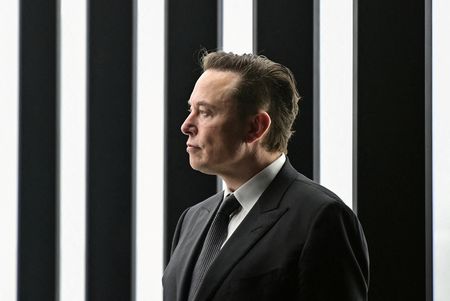By Daina Beth Solomon and Diego Oré
MEXICO CITY (Reuters) – Tesla Inc’s quest to build its first factory in Mexico reveals some of the shaky underpinnings of the country’s rise as a nearshoring darling, with proximity to U.S. buyers weighed down by concerns over power supply and political interference.
Mexican President Andres Manuel Lopez Obrador said Nuevo Leon at the U.S. border and Hidalgo in central Mexico are the two states leading the race for the coveted investment, and his foreign minister said on Friday that the electric vehicle maker led by billionaire Elon Musk was close to announcing expansion plans in Mexico.
Nuevo Leon – which recent reports suggest is now the most likely destination – boasts quick access to the United States, a skilled workforce and comfortable living for executives.
Hidalgo, just outside Mexico City, is hundreds of miles from the border yet land and labor costs are lower.
In either place, Tesla will depend on the federal government to tap in to Mexico’s strained energy supply and face difficulties securing substantial power from renewable sources.
That puts the Austin, Texas-based company – and any other major investor looking to build factories in Mexico – at the mercy of political forces mostly dictated by Lopez Obrador. The nationalist leader has prioritized Mexico’s state power utility, CFE, despite criticism that its fossil fuel turbines pollute and that it crowds out private enterprise.
The United States and Canada have formally entered a trade dispute over Mexico’s energy policy.
Many analysts also say the federal government appears to have tried to tip the scales in Hidalgo’s favor, as the state government is aligned with Lopez Obrador’s MORENA party and it is near one of the administration’s flagship projects, the Felipe Angeles International Airport.
“The political issues right now are very important to take into consideration and this is a perfect example,” said Claudio Rodriguez, a lawyer at Holland & Knight who specializes in energy. “The Nuevo Leon/Hidalgo issue is 100% political.”
Tesla and a spokesman for Lopez Obrador did not immediately reply to requests for comment.
It remains unclear exactly what Tesla’s investment in Mexico will look like and what the company plans to produce in the country.
RECENT DEALS
Musk’s interest in plunking a large investment into Mexico comes as the country is increasingly seen as a hotspot for nearshoring – the trend to move production closer to North American buyers and away from Asia, where supply-chain snarls during the pandemic overshadowed the region’s low-cost advantage.
With its low costs and location next to the U.S. market, Mexico emerged as an attractive alternative that is gradually luring manufacturing in sectors including autos, electronics and furniture.
Many deals have landed near Monterrey, Nuevo Leon’s wealthy capital, including for Tesla suppliers. Those deals include the first plant outside Asia for Taiwanese electronics company Quanta Computer and an expansion for Italian brakes maker Brembo.
In another recently announced deal, Germany’s BMW will invest near $870 million in the central state of San Luis Potosi to produce high-voltage batteries and electric cars.
Foreign direct investment in Mexico rose 12% last year to reach $35.3 billion, according to preliminary data, another sign that nearshoring is building momentum, analysts say.
Across the border, in another sign of the trend, U.S. manufacturing imports from Mexico rose 7% in 2021 versus 2019, the fastest pace in a decade.
Yet Mexico’s capacity for a nearshoring boom has been held back by Lopez Obrador, particularly his energy policies, analysts said. The federal government holds the keys to Mexico’s electricity supply, with the ability to speed up or delay requests to connect to the grid.
Lopez Obrador has rolled back a reform under his predecessor that he argues was too generous in opening up the energy market to private capital. He has suspended self-supply power generation permits, which allowed companies to arrange their own electricity supplies, and also hampered attempts by private companies to connect their power production to the national grid.
“Imagine what it would be like if you had profitable investment policy, energy efficiency … we would be flying at 30,000 feet and having endless investments,” said Juan Francisco Torres, an attorney at Hogan Lovells. “That is not happening.”
(Reporting by Diego Ore and Daina Beth Solomonin Mexico City; Additional reporting by Kylie Madry in Mexico City; Editing by Stephen Eisenhammer and Matthew Lewis)

